仁爱英语总复习
初三仁爱英语第一轮总复习教案

初三仁爱英语第一轮总复习教案2. right away 立刻,马上3. dark skin 黑皮肤light yellow skin 黄皮肤 fair skin 白皮肤4. the boy over there 在那边的那个男孩 the boy under the tree 在树下的那个男孩5.look like 看起来像look the same 看起来一样6. different looks 不同的外表7. good friends 好朋友 8. look at the picture 看着图片9. the pair of shoes / trousers 这双鞋/裤子10. 表示颜色的词语11. 关于颜色的提问:What color…?-- What color is the skirt? -- It’s white.-- What color are the shirts? - They are white.12. which疑问词的使用Which girl? The girl in red. 哪个女孩?穿红色衣服的那个女孩。
Which bag? The blue one. 哪个包?蓝色那个。
13. What does she look like? 她看起来怎么样?14. 区别以下两种问题:Mike’s pants are blue.What color are Mike’s pants?The blue pants are Mike’s.Which pants are Mike’s?15. Which color / bag / clothes do you like? 你喜欢哪种颜色/哪个包/哪件衣服?These are my favorite clothes. 这些是我最喜欢的衣服。
Topic 3 Whose jacket is this?词汇和重点句型:1. What does she / he look like?She is young with long legs. / He is short with black hair.2. Is the boy tall or short? He’s short.注意:选择疑问句的选择部分前部分要读升调,后部分读降调。
九年级仁爱英语复习教案
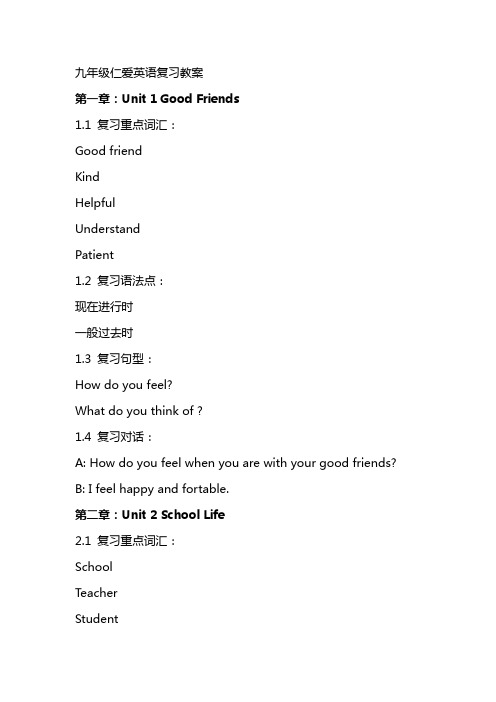
九年级仁爱英语复习教案第一章:Unit 1 Good Friends1.1 复习重点词汇:Good friendKindHelpfulUnderstandPatient1.2 复习语法点:现在进行时一般过去时1.3 复习句型:How do you feel?What do you think of ?1.4 复习对话:A: How do you feel when you are with your good friends? B: I feel happy and fortable.第二章:Unit 2 School Life2.1 复习重点词汇:SchoolTeacherStudentClassroomHomework2.2 复习语法点:一般现在时一般过去时2.3 复习句型:What does he/she look like?What does he/she do?2.4 复习对话:A: What does your teacher look like? B: My teacher is tall and thin.第三章:Unit 3 Colors3.1 复习重点词汇:ColorRedBlueGreenYellow3.2 复习语法点:一般现在时一般过去时3.3 复习句型:What color is it?I like3.4 复习对话:A: What color is your favorite? B: My favorite color is blue.第四章:Unit 4 Seasons4.1 复习重点词汇:SeasonSpringSummerAutumnWinter4.2 复习语法点:一般现在时一般过去时4.3 复习句型:What season is it?I like season.4.4 复习对话:A: What season is your favorite? B: My favorite season is spring. 第五章:Unit 5 FoodFoodRiceMeatVegetableFruit5.2 复习语法点:一般现在时一般过去时5.3 复习句型:What do you like to eat?Do you like?5.4 复习对话:A: What do you like to eat?B: I like to eat rice and vegetables. 第六章:Unit 6 Animals6.1 复习重点词汇:AnimalCatDogFishBird一般现在时一般过去时6.3 复习句型:What animal do you like? Does it like?6.4 复习对话:A: What animal do you like? B: I like dogs.第七章:Unit 7 Clothing 7.1 复习重点词汇:ClothingShirtPantsDressSkirt7.2 复习语法点:一般现在时一般过去时7.3 复习句型:What clothes do you like? What size do you wear?A: What clothes do you like? B: I like shirts and pants.第八章:Unit 8 Health8.1 复习重点词汇:HealthDoctorHospitalMedicineExercise8.2 复习语法点:一般现在时一般过去时8.3 复习句型:How are you?Do you need?8.4 复习对话:A: How are you?B: I'm fine, thank you.第九章:Unit 9 Travel9.1 复习重点词汇:TravelPlaceVisitTouristGuidebook9.2 复习语法点:一般现在时一般过去时9.3 复习句型:Where do you want to go?Do you want to?9.4 复习对话:A: Where do you want to go? B: I want to visit the Great Wall. 第十章:Unit 10 Nature10.1 复习重点词汇:NatureTreeFlowerSunMoon10.2 复习语法点:一般现在时一般过去时10.3 复习句型:What do you like about nature? Does it like?10.4 复习对话:A: What do you like about nature? B: I like the beautiful flowers and trees. 第十一章:Unit 11 Science11.1 复习重点词汇:ScienceExperimentTheoryScientistDiscovery11.2 复习语法点:一般现在时一般过去时11.3 复习句型:What is science?What discovery didmake?11.4 复习对话:A: What is science?B: Science is the study of the natural world. 第十二章:Unit 12 Technology12.1 复习重点词汇:TechnologyComputerInternetMobile phoneInvention12.2 复习语法点:一般现在时一般过去时12.3 复习句型:What technology do you like?How does technology affect?12.4 复习对话:A: What technology do you like?B: I like smartphones and the internet.第十三章:Unit 13 Environment13.1 复习重点词汇:EnvironmentPollutionRecyclingNatureConservation13.2 复习语法点:一般现在时一般过去时13.3 复习句型:What is the environment?How can we protect?13.4 复习对话:A: What is the environment?B: The environment is everything around us. 第十四章:Unit 14 Culture14.1 复习重点词汇:CultureTraditionFestivalArtLanguage14.2 复习语法点:一般现在时一般过去时14.3 复习句型:What is culture?What is your favorite?14.4 复习对话:A: What is culture?B: Culture is the way of life for a group of people.第十五章:Unit 15 Self-study15.1 复习重点词汇:Self-studyHabitSkillImprovementGoal15.2 复习语法点:一般现在时一般过去时15.3 复习句型:What is self-study?How can we improve?15.4 复习对话:A: What is self-study?B: Self-study is studying yourself to achieve your goals. 重点和难点解析重点词汇:每个章节中出现的重点词汇,如“good friend”、“school life”、“colors”、“seasons”、“food”等。
仁爱英语单词汇总+知识点梳理
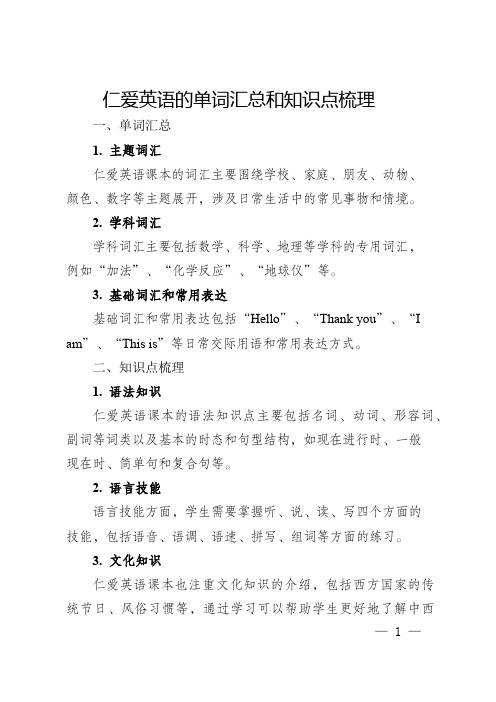
仁爱英语的单词汇总和知识点梳理
一、单词汇总
1. 主题词汇
仁爱英语课本的词汇主要围绕学校、家庭、朋友、动物、
颜色、数字等主题展开,涉及日常生活中的常见事物和情境。
2. 学科词汇
学科词汇主要包括数学、科学、地理等学科的专用词汇,
例如“加法”、“化学反应”、“地球仪”等。
3. 基础词汇和常用表达
基础词汇和常用表达包括“Hello”、“Thank you”、“I am”、“This is”等日常交际用语和常用表达方式。
二、知识点梳理
1. 语法知识
仁爱英语课本的语法知识点主要包括名词、动词、形容词、副词等词类以及基本的时态和句型结构,如现在进行时、一般
现在时、简单句和复合句等。
2. 语言技能
语言技能方面,学生需要掌握听、说、读、写四个方面的
技能,包括语音、语调、语速、拼写、组词等方面的练习。
3. 文化知识
仁爱英语课本也注重文化知识的介绍,包括西方国家的传统节日、风俗习惯等,通过学习可以帮助学生更好地了解中西
— 1 —
方文化的差异。
总的来说,仁爱英语的知识点涵盖了语言知识、语法知识、语言技能和文化知识等方面,对于提高学生的英语水平有着重要的作用。
在学习过程中,学生需要注意积累词汇和练习语法知识,同时注重培养听、说、读、写各方面的技能,以及了解中西方文化的差异和文化背景知识。
— 2 —。
仁爱英语七年级下册总复习-完成句子专项(Unit7~8)

仁爱英语七年级下册总复习-完成句子专项(Unit7~8)七年级英语下册Unit 7—8完成句子1.你了解迈克尔·菲尔普斯吗?Do you _________________ Michael Phelps?2.他是什么时候出生的?他是在1985年出生的。
When ______ he _________? He was born ______ 1985.3.你是迈克尔·菲尔普斯的超级粉丝。
You are ______________________ Michael Phelps.4.今天几月几号?5月8日。
What is ______________today? It is _______________.5.你的生日要来了。
Your birthday _____________________.6.你计划怎么样庆祝你的生日呢?How do you ________________________ your birthday?7.他在1997年5月13日出生。
He was born __________________________.8.你的礼物是什么形状的?它是圆的。
What is ________________of your present? It is ____________.9.我可以看一看吗?对不起,我恐怕你不能。
May I _____________________? Sorry, ______________ you can’t.10.哦,我明白了,它是一个足球。
Oh, I ______________.It is a soccer ball.11.它之前像一朵花吗?不,它不像。
_______ it _______ a flower before? No, it ________.12.它是什么形状的?它是一个三角形。
What __________ is it? It is _______________.13它有多长?有24厘米长。
仁爱英语八年级U2T1综合复习讲义
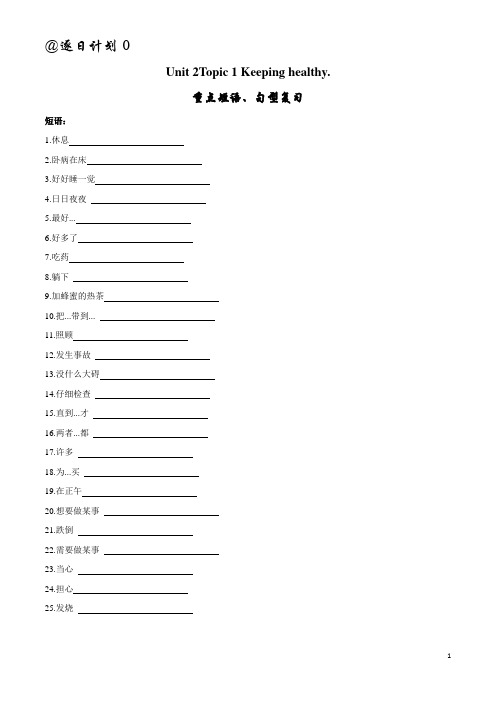
Unit 2Topic 1 Keeping healthy.重点短语、句型复习短语:1.休息2.卧病在床3.好好睡一觉4.日日夜夜5.最好...6.好多了7.吃药8.躺下9.加蜂蜜的热茶10.把...带到...11.照顾12.发生事故13.没什么大碍14.仔细检查15.直到...才16.两者...都17.许多18.为...买19.在正午20.想要做某事21.跌倒22.需要做某事23.当心24.担心25.发烧句型:1. What`s wrong with you/him/her?你/他/她怎么了?2.You should see a dentist.你应该去看牙医。
这是一种表达建议的句子。
还可以用以下句式:you`d3.I`m sorry to hear that.听到这个消息我很难过。
4.You look pale.你看起来很苍白。
5.------Shall I take you to the hospital?我送你去医院吧?-------No,thank you.不用,谢谢。
6. I`ll take some medicine and see how it goes. 我打算先吃药看看情况再说。
7.You`d better drink hot tea with honey.你最好喝加蜂蜜的热茶。
8.Michael had an accident yesterday.昨天迈克发生了事故。
9.But my left leg still hurts when I move it.可是当我挪动脚时,还是有点儿疼。
10.Your X-rays show it`s nothing serious.你的X光照片显示没什么严重的问题。
11.Stay in bed and don`t move your leg too much.躺在床上,不要总是挪动你的腿。
12.Michael`s friends bought some chocolate for him .迈克的朋友给他买饿一些巧克力。
仁爱英语七年级下期末总复习易错题汇总(经典)
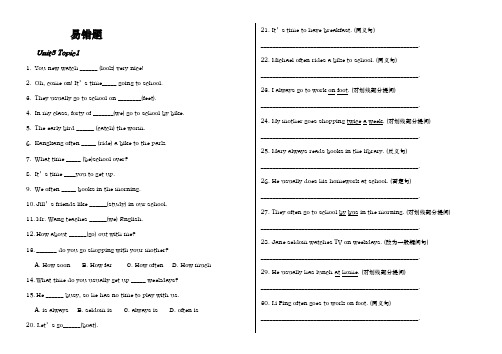
易错题Unit5 Topic11.You new watch ______ (look) very nice!2.Oh, come on! It’s time_____ going to school.3.They usually go to school on ________(feet).4.In my class, forty of _______(we) go to school by bike.5.The early bird ______ (catch) the worm.6.Kangkang often _____ (ride) a bike to the park.7.What time _____ (be)school over?8.It’s time ____you to get up.9.We often _____ books in the morning.10.Jill’s friends like ______(study) in our school.11.Mr. Wang teaches ______(we) English.12.How about ______(go) out with me?13._______ do you go shopping with your mother?A. How soonB. How farC. How oftenD. How much14.What time do you usually get up _____ weekdays?15.He ______ busy, so he has no time to play with us.A. is alwaysB. seldom isC. always isD. often is20. Let’s go______(boat). 21. It’s time to have breakfast. (同义句)______________________________________________________.22. Michael often rides a bike to school. (同义句)______________________________________________________.23. I always go to work on foot. (对划线部分提问)______________________________________________________.24. My mother goes shopping twice a week. (对划线部分提问)______________________________________________________.25. Mary always reads books in the library. (反义句)______________________________________________________.26. He usually does his homework at school. (否定句)______________________________________________________.27. They often go to school by bus in the morning. (对划线部分提问) ______________________________________________________.28. Jane seldom watches TV on weekdays. (改为一般疑问句)______________________________________________________.29. He usually has lunch at home. (对划线部分提问)______________________________________________________.30. Li Ping often goes to work on foot. (同义句)______________________________________________________.31. 几乎没有学生乘地铁去学校。
(仁爱版)七年级英语总复习Unit-2知识点、练习和参考答案
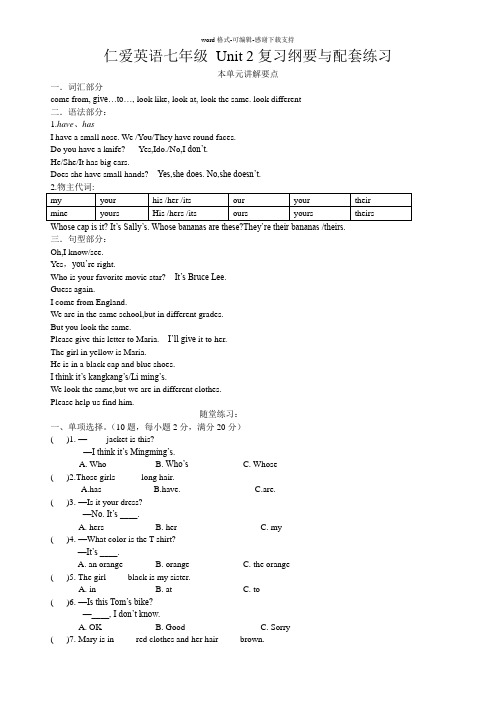
仁爱英语七年级Unit 2复习纲要与配套练习本单元讲解要点一.词汇部分come from, give…to…, look like, look at, look the same. look different二.语法部分:1.have、hasI have a small nose. We /You/They have round faces.Do you have a knife? Yes,Ido./No,I don’t.He/She/It has big ears.Does she have small hands? Yes,she does. No,she doesn’t.Whose cap is it? It’s Sally’s. Whose bananas are these?They’re their bananas /theirs.三.句型部分:Oh,I know/see.Yes,you’re right.Who is your favorite movie star? It’s Bruce Lee.Guess again.I come from England.We are in the same school,but in different grades.But you look the same.Please give this letter to Maria. I’ll give it to her.The girl in yellow is Maria.He is in a black cap and blue shoes.I think it’s kangkang’s/Li ming’s.We look the same,but we are in different clothes.Please help us find him.随堂练习:一、单项选择。
(10题,每小题2分,满分20分)( )1. —____ jacket is this?—I think it’s Mingming’s.A. WhoB. Who’sC. Whose( )2.Those girls _____ long hair.A.hasB.have.C.are.( )3. —Is it your dress?—No. It’s ____.A. hersB. herC. my( )4. —What color is the T-shirt?—It’s ____.A. an orangeB. orangeC. the orange( )5. The girl ____ black is my sister.A. inB. atC. to( )6. —Is this Tom’s bike?—____, I don’t know.A. OKB. GoodC. Sorry( )7. Mary is in ____ red clothes and her hair ____ brown.A. /; isB. a; areC. /; are( )8. —Do you look like your sister?—No, we ____.A. look the sameB. look differentC. look like( )9. —You are nice in this dress.—____A. It’s right.B. No, it isn’t.C. Thank you.( )10.-What does your brother look like?-She has _____nose.A.a big red B .a red big C.red big二、词汇运用。
仁爱版英语九年级上册总复习试卷

九年级英语测试题I卷听力部分(共20分)I .听句子,选答语。
(5 分)( )had.,he did, he did.()done.’m sorry to hear that()idea..’s a pleasure.( )is Hua did. C. Yes,Idid.( )a fine day B.Fine,thank you C.I amwell. II.听对话及问题,选答案。
(5 分)( )Tan.lei.Honglin( ) B. 8:30 C.8:25( ) B. Sam. C.Jane.( )9 .A. In the library. B. In the shopthe post office.( )over two months.three years.or two years.III.听短文,选答案。
(10 分)( ) did they buy a little dogA. Last Sunday.B. Last year.month( ) did they buy a little dogA. Because her daughter loves a dog.B. Because her daughter doesn’t have any friends.C.Because they are rich.( ) many children do they haveone daughter. B.Two daughter.dog and a daughter( ) did the man stop smokingA. Because of his wifeB.Because of his daughter. ofhis dog.( ) of the following is trueA.It ’s easier to look after the girl. dog is alwaysvery clean.B.They have to wash a lot of dirty clothes fortheir daughter.笔试部分(100分)IV. 选择填空。
仁爱版七年级下册英语复习知识点
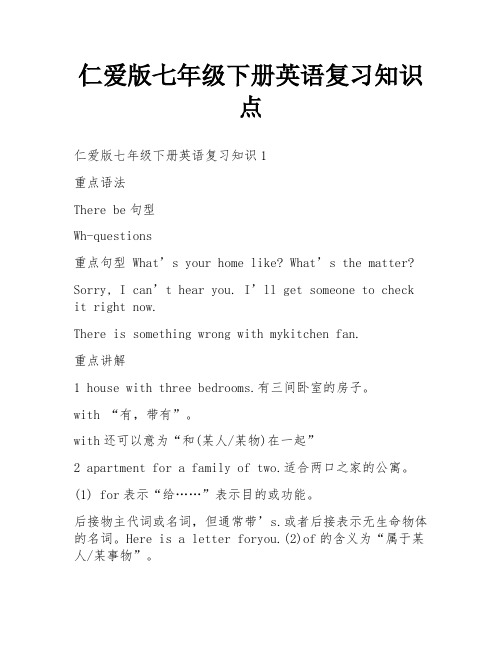
仁爱版七年级下册英语复习知识点仁爱版七年级下册英语复习知识1重点语法There be句型Wh-questions重点句型What’s your home like? What’s the matter?Sorry, I can’t hear you. I’ll get someone to check it right now.There is something wrong with mykitchen fan.重点讲解1 house with three bedrooms.有三间卧室的房子。
with “有,带有”。
with还可以意为“和(某人/某物)在一起”2 apartment for a family of two.适合两口之家的公寓。
(1) for表示“给……”表示目的或功能。
后接物主代词或名词,但通常带’s.或者后接表示无生命物体的名词。
Here is a letter foryou.(2)of的含义为“属于某人/某事物”。
She is a friend of Lily’s. = She is Lily’s friend.3 What’s the matter?怎么了?该句常用来询问某或某物出了什么什么问题或毛病;询问具体某人或某物出了什么问题时,还可以表达为:What’s the matter with sb./sth.某人或某物出了什么毛病。
What’s the matter? = What’swrong?4 Ihear you playing the piano.我听见你在弹钢琴。
hear…doing sth.“听见……在做某事”,强调正在进行的动作。
hear…dosth.“听见……做了某事”,强调全过程。
hearabout sth.听到关于某事物的消息 hear from sb.接到某人的来信、电话等hear of sb./sth.听到或知道某人或某事物的情况5 a lot of = lots of许多后接可数名词,相当于many;后接不可数名词,相当于much,用于肯定句中;但是注意:如果是否定句,则常用many或much.6 be far from… 离……远(抽象距离)be…away from…离……远(具体距离)My school is not far from thebookstore. The sea is 2 miles away fromthe hotel.7 There is something wrong with sb./sth.某人或某物出问题/有毛病了。
七年级仁爱英语上册知识点总复习.doc
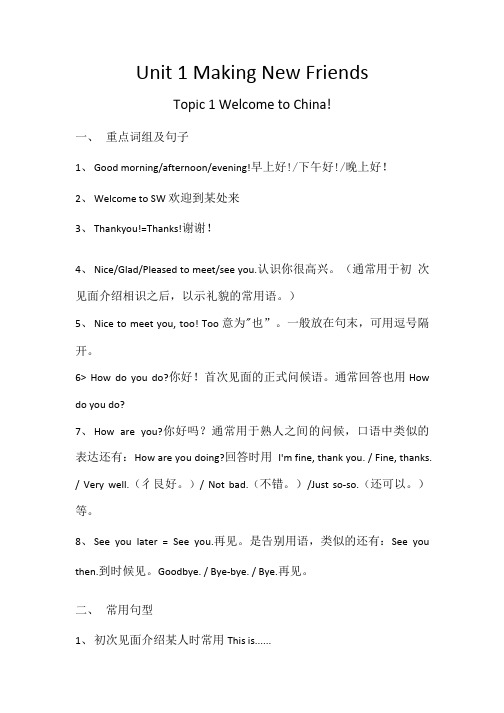
Unit 1 Making New FriendsTopic 1 Welcome to China!一、重点词组及句子1、Good morning/afternoon/evening!早上好!/下午好!/晚上好!2、Welcome to SW 欢迎到某处来3、Thankyou!=Thanks!谢谢!4、Nice/Glad/Pleased to meet/see you.认识你很高兴。
(通常用于初次见面介绍相识之后,以示礼貌的常用语。
)5、Nice to meet you, too! Too意为"也”。
一般放在句末,可用逗号隔开。
6> How do you do?你好!首次见面的正式问候语。
通常回答也用How do you do?7、How are you?你好吗?通常用于熟人之间的问候,口语中类似的表达还有:How are you doing?回答时用I'm fine, thank you. / Fine, thanks. / Very well.(彳艮好。
)/ Not bad.(不错。
)/Just so-so.(还可以。
)等。
8、See you later = See you.再见。
是告别用语,类似的还有:See you then.到时候见。
Goodbye. / Bye-bye. / Bye.再见。
二、常用句型1、初次见面介绍某人时常用This is......2、自我介绍用I'm xxx.3、询问对方是不是某人用Are you xxx?肯定回答用:Yes, I am.(注意不能缩写)否定回答用:No, Tin not.三、语法要点1、Be动词的用法Be动词有三个am, is, are。
Am只能跟I搭配;is用于单数主语的后面he, she , it或是xxx; are用于复数主语的后面you, they, we.2、一般疑问句的用法如何将陈述句改为一般疑问句(1)如果句中有Be动词或是情态动词can, could, will, would, may等直接把Be动词或情态动词提到句首。
仁爱版七年级上册英语全册复习笔记
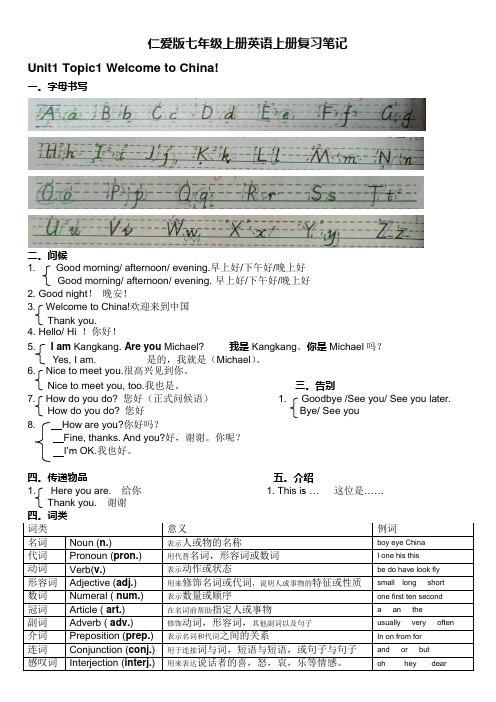
仁爱版七年级上册英语上册复习笔记Unit1 Topic1 Welcome to China!一。
字母书写二。
问候1. Good morning/ afternoon/ evening.早上好/下午好/晚上好Good morning/ afternoon/ evening. 早上好/下午好/晚上好2. Good night!晚安!3. Welcome to China!欢迎来到中国Thank you.4. Hello/ Hi !你好!5. I am Kangkang. Are you Michael? 我是Kangkang。
你是Michael 吗?Y e s, I am. 是的,我就是(M ichael)。
6. Nice to meet you.很高兴见到你。
Nice to meet you, too.我也是。
三。
告别7. How do you do? 您好(正式问候语) 1. Goodbye /See you/ See you later.How do you do? 您好Bye/ See you8. How are you?你好吗?Fine, thanks. And you?好,谢谢。
你呢?I’m OK.我也好。
四。
传递物品五。
介绍1. Here you are. 给你 1. This is …这位是……Thank you. 谢谢四。
词类词类意义例词名词Noun (n.) 表示人或物的名称boy eye China代词Pronoun (pron.) 用代替名词,形容词或数词I one his this动词Verb(v.) 表示动作或状态be do have look fly形容词Adjective (adj.) 用来修饰名词或代词,说明人或事物的特征或性质small long short 数词Numeral ( num.) 表示数量或顺序one first ten second冠词Article ( art.) 在名词前帮助指定人或事物 a an the副词Adverb ( adv.) 修饰动词,形容词,其他副词以及句子usually very often 介词Preposition (prep.) 表示名词和代词之间的关系In on from for连词Conjunction (conj.) 用于连接词与词,短语与短语,或句子与句子and or but感叹词Interjection (interj.) 用来表达说话者的喜,怒,哀,乐等情感。
Unit 5 topic 2 总复习课件 仁爱版英语七年级下册
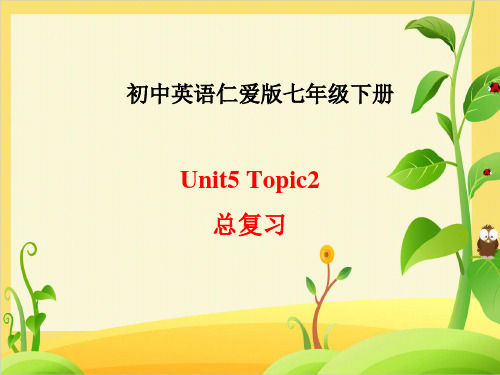
KK: Thank you all the same. Bye! Girl: Bye!
句型连连看
句型连连看
重点句子有哪些?看谁说得多!
词汇集中营
单词填空,考查综合运用能力!
LM: Excuse me, may I borrow some Englishworkbooks? Girl: Of course . Many students are using them. ( The girl looks for the books on the shelves.)
6. 在教师办公室 6. in the teachers’ office
7. 在游泳池
7. in theswimming pool
8. 在操场
8. on the playground
9. 在体育馆/图书馆/实验室/餐厅
9. in the gym / library/ lab/ dining hall 10. 打扫卫生
(1) We need to go shopping. There is __A___ juice left in the fridge.
A. little
B. few
C. many
D. much
【解析】few和many修饰可数名词复数,little和much修饰不可数名词。根据语境可
知冰箱里几乎没有果汁了,juice是不可数名词,用little修饰。故答案为A。
快速回忆所学单词,看谁说得又快又准!
2. 操场 playground 3. 实验室 lab
仁爱英语九年级上册知识点总结复习专用
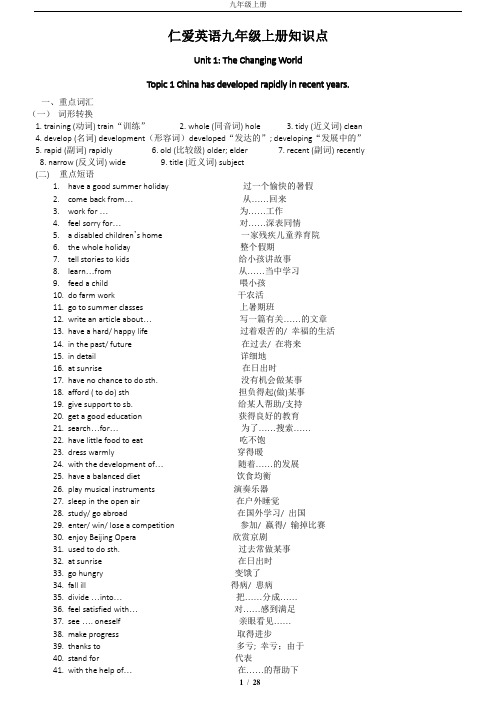
仁爱英语九年级上册知识点Unit 1: The Changing WorldTopic 1 China has developed rapidly in recent years.一、重点词汇(一)词形转换1. training (动词) train“训练”2. whole (同音词) hole3. tidy (近义词) clean4. develop (名词) development(形容词)developed“发达的”; developing“发展中的”5. rapid (副词) rapidly6. old (比较级) older; elder7. recent (副词) recently8. narrow (反义词) wide 9. title (近义词) subject(二)重点短语1.have a good summer holiday 过一个愉快的暑假e back from…从……回来3.work for …为……工作4.feel sorry for…对……深表同情5. a disabled children’s home 一家残疾儿童养育院6.the whole holiday 整个假期7.tell stories to kids 给小孩讲故事8.learn…from 从……当中学习9.feed a child 喂小孩10.do farm work 干农活11.go to summer classes 上暑期班12.write an article about…写一篇有关……的文章13.have a hard/ happy life 过着艰苦的/ 幸福的生活14.in the past/ future 在过去/ 在将来15.in detail 详细地16.at sunrise 在日出时17.have no chance to do sth. 没有机会做某事18.afford ( to do) sth 担负得起(做)某事19.give support to sb. 给某人帮助/支持20.get a good education 获得良好的教育21.search…for…为了……搜索……22.have little food to eat 吃不饱23.dress warmly 穿得暖24.with the development of…随着……的发展25.have a balanced diet 饮食均衡26.play musical instruments 演奏乐器27.sleep in the open air 在户外睡觉28.study/ go abroad 在国外学习/ 出国29.enter/ win/ lose a competition 参加/ 赢得/ 输掉比赛30.enjoy Beijing Opera 欣赏京剧ed to do sth. 过去常做某事32.at sunrise 在日出时33.go hungry 变饿了34.fall ill 得病/ 患病35.divide …into…把……分成……36.feel satisfied with…对……感到满足37.see …. oneself 亲眼看见……38.make progress 取得进步39.thanks to 多亏; 幸亏;由于40.stand for 代表41.with the help of…在……的帮助下42.draw up an outline 拟定提纲三、重点句型1.You have just come back from your hometown. 你刚刚从你的家乡返回。
九年级仁爱英语复习教案
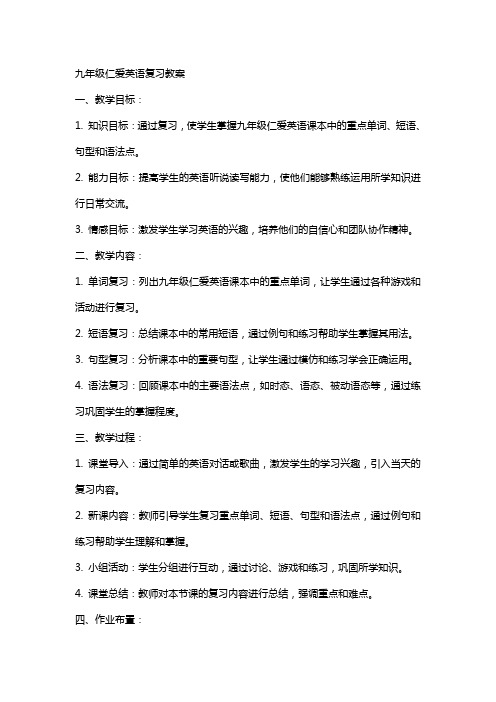
九年级仁爱英语复习教案一、教学目标:1. 知识目标:通过复习,使学生掌握九年级仁爱英语课本中的重点单词、短语、句型和语法点。
2. 能力目标:提高学生的英语听说读写能力,使他们能够熟练运用所学知识进行日常交流。
3. 情感目标:激发学生学习英语的兴趣,培养他们的自信心和团队协作精神。
二、教学内容:1. 单词复习:列出九年级仁爱英语课本中的重点单词,让学生通过各种游戏和活动进行复习。
2. 短语复习:总结课本中的常用短语,通过例句和练习帮助学生掌握其用法。
3. 句型复习:分析课本中的重要句型,让学生通过模仿和练习学会正确运用。
4. 语法复习:回顾课本中的主要语法点,如时态、语态、被动语态等,通过练习巩固学生的掌握程度。
三、教学过程:1. 课堂导入:通过简单的英语对话或歌曲,激发学生的学习兴趣,引入当天的复习内容。
2. 新课内容:教师引导学生复习重点单词、短语、句型和语法点,通过例句和练习帮助学生理解和掌握。
3. 小组活动:学生分组进行互动,通过讨论、游戏和练习,巩固所学知识。
4. 课堂总结:教师对本节课的复习内容进行总结,强调重点和难点。
四、作业布置:1. 复习课堂所学内容,整理笔记。
2. 完成课后练习题,巩固所学知识。
3. 准备课堂展示,展示自己的英语能力。
五、教学评价:1. 课堂参与度:观察学生在课堂上的积极参与程度,评估他们的学习兴趣和动力。
2. 作业完成情况:检查学生作业的完成质量,评估他们对课堂所学知识的掌握程度。
3. 课堂展示:评价学生在课堂展示中的表现,考察他们的英语听说能力和自信心的培养。
六、教学策略:1. 多样化教学:运用图片、音频、视频等多种教学资源,丰富教学手段,提高学生的学习兴趣。
2. 任务型教学:设计各种实际的英语任务,让学生在完成任务的过程中运用所学知识,提高他们的实践能力。
3. 互动式教学:鼓励学生积极参与课堂互动,通过讨论、问答、游戏等活动,提高他们的英语听说能力。
七、教学资源:1. 课本:九年级仁爱英语课本,作为复习的主要依据。
(仁爱版)七年级英语总复习Unit 1知识点、练习和参考答案
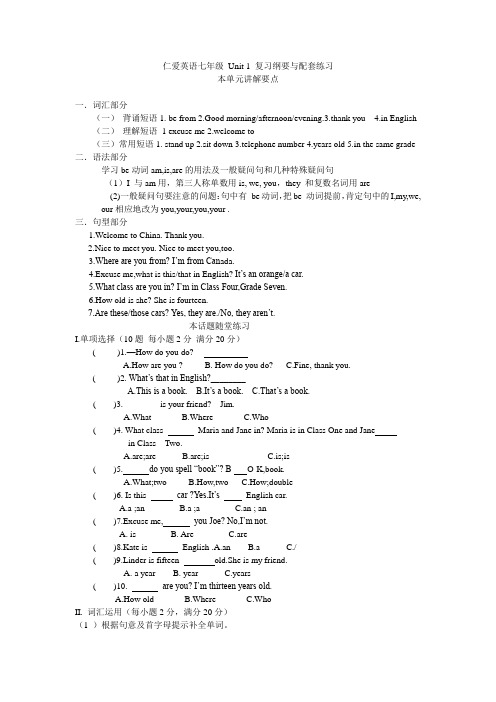
仁爱英语七年级Unit 1 复习纲要与配套练习本单元讲解要点一.词汇部分(一)背诵短语1. be from 2.Good morning/afternoon/evening.3.thank you 4.in English (二)理解短语 1 excuse me 2.welcome to(三)常用短语1. stand up 2.sit down 3.telephone number 4.years old 5.in the same grade 二.语法部分学习be动词am,is,are的用法及一般疑问句和几种特殊疑问句(1)I 与am用,第三人称单数用is, we, you,they 和复数名词用are(2)一般疑问句要注意的问题:句中有be动词,把be 动词提前,肯定句中的I,my,we,our相应地改为you,your,you,your .三.句型部分1.Welcome to China. Thank you.2.Nice to meet you. Nice to meet you,too.3.Where are you from? I’m from Can ada.4.Excuse me,what is this/that in English? It’s an orange/a car.5.What class are you in? I’m in Class Four,Grade Seven.6.How old is she? She is fourteen.7.Are these/those cars? Yes, they are./No, they aren’t.本话题随堂练习I.单项选择(10题每小题2分满分20分)( )1.—How do you do?--A.How are you ?B. How do you do?C.Fine, thank you.( )2. What’s that in English?________A.This is a book.B.It’s a book.C.That’s a book.( )3. ________is your friend? Jim.A.WhatB.WhereC.Who( )4. What class Maria and Jane in? Maria is in Class One and Janein Class Two.A.are;areB.are;isC.is;is( )5. do you spell “book”? B- O-K,book.A.What;twoB.How,twoC.How;double( )6. Is this car ?Yes.It’s English car.A.a ;anB.a ;aC.an ; an( )7.Excuse me, you Joe? No,I’m not.A. isB. AreC.are( )8.Kate is English .A.an B.a C./( )9.Linder is fifteen old.She is my friend.A. a yearB. yearC.years( )10. are you? I’m thirteen years old.A.How oldB.WhereC.WhoII. 词汇运用(每小题2分,满分20分)(1 )根据句意及首字母提示补全单词。
仁爱英语七年级上册期末总复习之词组与句型

仁爱英语七年级上册词组和句型Unit 1 Topic 11、我是康康。
I ’m Kangkang./My name is Kangkang.2、-你是玛丽亚吗?-Are you Maria?-是的,我是。
/不,我不是。
-Yes, I am. /No, I’m not.3、早上好!Good morning.4、欢迎来中国。
Welcome to China.5、谢谢你。
Thank you./Thanks.6、很高兴认识你。
Nice to see you. / Nice to meet you.7、这是我的老师。
This is my teacher.8、你好!How do you do?9、-你好吗?-How are you?-我很好,谢谢。
你呢? -I ’m fine, thanks. And you?-我也很好。
-I ’m fine,too.Unit 1 Topic 21、打扰一下。
Excuse me.2、-你叫什么名字?-What ’s your name?-我的名字叫Tom-My name is Tom.3、-你是哪里人?-Where are you from? / Where do you come from? -我是美国人。
-I’m from the USA./ I come from America.4、-你是日本人吗?-Are you from Japan?-不,我不是。
我是中国人。
-No, I’m not. I’m from China.5、-他们是谁?-Who are they?-他们是Maria 和Jane 。
-They are Maria and Jane.6、-你的电话号码是什么?-What ’s your telephon e number?7、-谢谢你。
-Thank you.-不用谢。
-You are welcome. / That’s all right. / Not at all.8、-他来自哪里?-Where is he from? /Where does he come from. -他来自加拿大。
仁爱版七年级英语上册总复习完整版
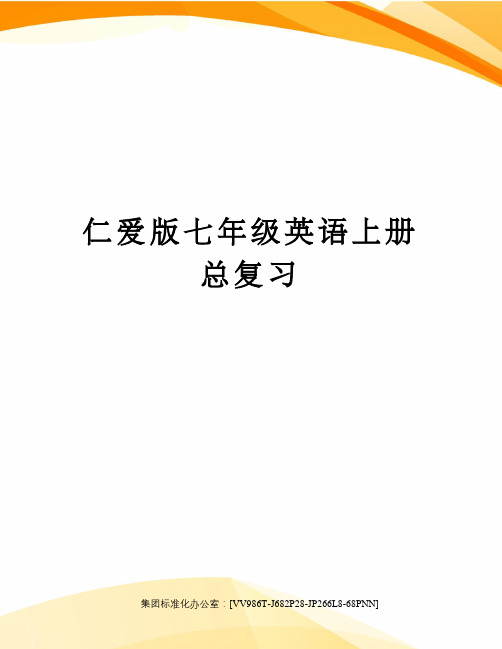
仁爱版七年级英语上册总复习集团标准化办公室:[VV986T-J682P28-JP266L8-68PNN]英语七年级上册知识点归纳Unit11、Goodmorning/afternoon/evening早上/下午/晚上好Goodnight晚安(晚上告别)2、glad/nicetomeet/seeyou见到你很高兴(回答也一样)3、welcometo+地点欢迎来到……(回答:Thankyou或者Thanks)4、let’s+V让我们做……(原)5、standup起立sitdown坐下6、thisis-----这是……(用于介绍第三者的用语)7、Howdoyoudo你好(回答也是:Howdoyoudo)8、Howareyou你好吗Fine,thankyou.andyou很好;谢谢;你呢I’mOK/I’mfine,too.我也很好。
9、seeyou=seeyoulater=seeyousoon=good-bye再见10、excuseme打扰一下;请问11、I’m-----=mynameis----我是……12、befrom=comefrom来自13、inEnglish用英语14、CanyouspellitYes/No你能拼写它吗能/不能15、That’sOK/That’sallright/You’rewelcome/Notatall不用谢16、……yearsold?……岁17、telephonenumber电话号码QQnumberQQ号码IDnumber身份证18、thesame(相同的)反义词是different(不同的)例:Weareinthesamegrade,butweareindifferentclasses.句型:1.Whatisyourname你的名字是什么2.Where+be+主语+from某人来自于哪里(回答:主语+be+地点)Whereareyoufrom?Iamfromquanzhou.3.Howold+be+主语某人几岁(回答:主语+be+数字)例:Howoldareyou?I’mforteen.4.Whatisyourtelephonenumber你的电话号码是多少(回答:Mytelephonenumberis----或者It’s-------)注意:读出号码的时候要逐个读出。
(完整版)仁爱英语中考九年级全一册知识点总复习整理版
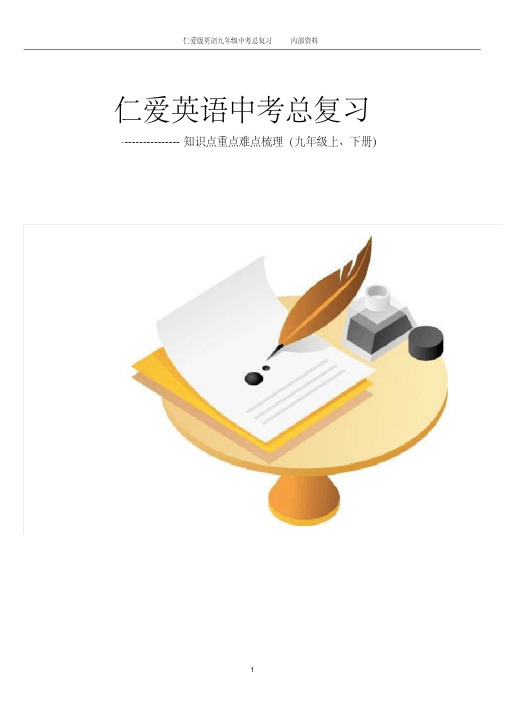
仁爱英语中考总复习----------------知识点重点难点梳理(九年级上、下册)九年级(上)Unit 1Unit 1 Topic 1短语take photos 照相so…that 如此……以致于have /has been to 到过an English training school 一所英语培训学校在地take part in 参加 a disabled child 残疾儿童learn…from 从……学会around the world 全世界in the past 在过去in detail 详细地no chance 没机会make money 赚钱give support to 为某人提供帮助get a good education 得到好的教育have/has gone to 到过by the way 顺便问一下search the internet 上网used to be 去过曾经是with the development of China 随着中国的发展at sunrise 日出时grow cotton 种植棉花go hungry 变得很饿shout at 对…… 喊叫divide…into 把……分成send…to 把……送到…… at that time 在那时feel satisfied with 对……满意be used to do sth. 被用来做…… more than 超过during the vacation 在假期期间living condition 生活条件in recent years 在近几年make progress 取得进步live in present 立足现在dream about 展望未来happen to somebody/something ( 事情)发生在……身上,临到……头上happen to do something 碰巧thanks to 因为……,the capital of China中国首都host the 2008 Olympic Games 举办2008奥运会stand for 代表as well 也prepare for为…… 做准备taken place 发生with the help of 在……帮助下1.spend time (in) doing something 花费时间做某事2.see somebody doing something 看见某人做某事3.There goes the bell. 铃响了。
仁爱版七年级英语下册总复习重点短语和句型

仁爱版七年级下英语总复习材料Unit 5 Our School LifeTopic 1 how do you usually go to school ?1.at the school gate 在学校大门口2.Happy New Year! 新年快乐3.The same to you! 也同样祝你--- ---4.looks very nice! 看起来漂亮e to school 来上学e by bike= ride(s) a bike 骑自行车7.go by subway=take(s) the subway= in asubway乘地铁8.go by bus=take (s) a bus / in a bus / on abus 乘公共汽车9.by plane / by air /in a plane / on a plane乘飞机10.by car /in a car / take a car 坐小汽车11.by train / in a train / on a train / take atrain乘火车12.by ship/by boat / on a ship/boat / take theship 坐船13.go on foot=walk to 步行14.walk to school 走路上学15.watch TV 看电视16.do one`s homework 做家庭作业17.see a movie 看电影18.Good evening 晚上好19.want to do sth 想要做某事20.what time 什么时间21.get up起床22.on weekdays 周末23.at about six o’clock 在大约六点钟e on 快点25.It`s time for class 该上课了26.It`s time to have class 该上课了27.know about 了解--- --- 的情况28.school life 学校生活29.American students 美国学生30.take a yellow school bus 乘一辆黄色的校车31.have/has lunch 吃午餐32.at school 在学校,在上学33.eat out外出吃饭,上馆子34.on school days 在校期间35.have a short rest休息一会儿36.after lunch午餐后37.after supper/after dinner 晚饭后38.after class下课后39.after school放学后40.listen to music 听音乐41.read books看书42.go to the park 去公园43.go to the zoo去动物园44.go to the library去图书馆45.go to school去上学46.go to work去上班47.school is over 放学了48.class is over 下课了49.in one`s free/spare time50.在某人的业余时间里51.play basketball 打篮球52.play soccer 踢足球53.go swimming 去游泳54.go shopping 去买东西55.go fishing 去钓鱼56.go skating 去滑旱冰57.go skiing 去滑冰58.go climbing mountains 去爬山59.go hiking 去远足60.how often多久一次61.ball games 球赛62.have ball games 举行球赛63.four times a year 每年四次64.meet friends 见朋友65.once a week 每周一次66.twice a week 每周两次67.three times a week 每周三次68.Work must come first! 工作〔学习〕必须放在第一69.twenty past six 六点过二十分70.at twenty past six 在六点二十分71.have / has breakfast 吃早餐72.have / has lunch 吃午餐73.have / has supper 吃晚餐74.have / has dinner 吃晚餐75.half past seven 七点半76. a quarter past five 五点过十五分77.get home 到家78.go / goes to bed 上床睡觉79. a quarter to ten 十点过十五分80.drive a car 开小汽车81.the Great Wall 长城Topic 2 He is playing soccer on theplaygroundputer room 电脑室2.dining hall 食堂3.teachers` office 教师办公室4.classroom building 教学楼5.swimming pool 游泳池6.in the library 在图书馆7.in the dormitory 在宿舍里8.in the dining hall 在食堂里9.on the playground 在操场上10.at the moment = now此刻,现在11.clean the dormitory打扫宿舍12.clean the bedroom 打扫卧室13.clean the classroom 打扫教室14.clean the blackboard擦黑板15.make cards 制作卡片16.Would you like to --- --- ?17.你想做--- --- 吗?18.Good idea!好主意19.See you soon 一会儿见20.play computer games 玩电脑游戏21.May I borrow --- --- 我可以借--- ---吗?22. a few几个,一些23.Ren’ai Project English workbooks 仁爱英语练习册24.of course = sure = certainly 当然25.on time 准时26.in time 及时27.many students 许多学生28.do well in= be good at sth / doing sth在--- ---做得好29.do better in 在--- --- 做得更好30.31.on the shelf 在书架上32.return = give back 归还33.It’s a pleasure 不用谢34.Thank you all the same 还是要谢谢你35.lost and found 失物招领处36.looking for 寻找37.some money 一些钱38. a picture of my family 一张全家福照片39.thank you all the same 还是要谢谢你40.school student card 学生卡41. a pair of pants 一条裤子42. a pair of shoes 一双鞋43.two pairs of shoes 两双鞋44.singing in the room 在房间里唱歌45.dancing in the gym 在体育馆跳舞46.swimming in the gym 在体育馆游泳47.show sb around 带领某人参观48.in the center of= in the middle of 在------ 的中间,在--- --- 的中央49.on the left 在左边50.on the right 在右边51.next to 在--- --- 隔壁,在--- ---旁边,紧挨看,靠近52.at the back of 在--- ---后部,在--- --- 后53.near the playground 在操场的附近54.in the gym 在体育馆里,在健身房里55.in the swimming pool在游泳池里56.talk about their families 谈论他们家庭57.Attention, please ! 请注意!58.between --- and --在--- --- 和--- --- 之间59.stamp collection show 集邮展60.school hall 学校大厅61.every Saturday 每个星期六62.he is running 他在跑步63.in picture 1 在第一张照片里64.in picture 2 在第二张照片里65.look(looks) happy 看起来高兴66.love swimming 喜欢游泳67.talk to a Japanese girl和一个日本女孩交谈68.play the guitar 弹吉它69.in the classroom 在教室里70.in the office 在办公室里71.in the dormitory 在宿舍里72.on the playground 在操场上Topic 3 our school is very interesting1.What day 用来提问“星期几”2.have a music class 上一节音乐课3.at ten o`clock 十点钟4. a quarter to eleven 十点四十五分5.have a biology lesson上一节生物课6.have a geography 上一节地理课7.have a P.E. lesson 上一节体育课8.have an art lesson 上一节美术课9.outdoor activities 户外活动10.how many lessons 多少节课11.every week 每周12.singing and dancing唱歌跳舞13.drawing pictures 画画14.Working on math problems 做数学题15.speaking English 说英语16.learning about the past 了解过去17.an English book 一本英语书18.What do you think of it = How do youlike it ? 你觉得它怎么样?19.Difficult and boring 难学而且乏味20.Which subject 哪一门课21.Easy and interesting 容易又有趣22.Favorite subject 最喜欢的科目23.My school life 我的学校生活24.At school 在学校里,在上学25.Be friendly to sb = be kind to sb 对某人友好26.In the morning 在上午,在早晨27.In the afternoon 在下午28.I aften speak English with my classmates我经常和我的同学说英语29.After school 放学后30.Play basketball with my classmates和同学们打篮球31.On the playground 在操场上32.Every Tuesday 每周二33.Every Thursday 每周四34.school newpaper 校报35.School Time 校园时代36.And so on 等等37.Science Today 当代科学38.Thank sb for doing sth 感谢某人做了某事39.best wishes 致以美好的祝愿40.read stories 看故事书41.have a biology class 上生物课42.have breakfast 吃早饭43.run on the playground 在操场上跑步44.have a physics class上物理课45.watch animals 欣赏动物46.play soccer at school 在学校踢足球47.read a book at home 在家看书48.have dinner in the school dinning hall在学校食堂吃晚饭49.have dinner at home 在家吃晚饭Unit 6 Our Local AreaTopic 1 Is there a sofa in your study?1.On the second floor 在二楼2.Why not =Why don`t you为什么不--- --- ?3.Go upstairs 上楼4.Go downstairs 下楼5.Have a look 看一看6. A moment later 过了一会儿e in ,please 请进8.So many books 这么多的书9.On the shelf 在书架上10.You have a nice study你的书真漂亮!11.Dining room 餐厅12.Living room 客厅13.On the first floor 在一楼14.Cousins 表姐妹,表兄弟15.In the front of the house 在房子前面16.In the kitchen 在厨房17.In the study 在书房18.In the dinning room 在餐厅19.In the bedroom 在卧室20.In the garden 在花园21.Behind the door 在门后面22.Play with his pet dog和他的宠物狗玩耍23.Play games 玩游戏24.Clean the car 清洗小汽车25.Read books 看书26.Have dinner 吃饭27.Talk about 谈论28.Near my desk 在我桌子旁29.On your desk 在你桌子上30.So on 等等31.My family photo 我的全家福照片32.On the wall 在墙上33.Put them away 请把它们收起来放好34.Put it away,please把它/它们收起来放好35.Look after = take care of 照看,照顾36.In front the house 房子前面37.In the bottle 瓶子里38.Near the window 窗户边39.In the glass 杯子里40.Model planes 飞机模型41.Under the bed 床下42.How many pairs 多少双43.In the tree 树上44.On the tree 树上45.On the shelf 书架上46.On the river 河里47. A small garden 一个小花园48.Many beautiful flowers 许多美丽的花49.In the garden 花园里50. A big tree 一棵大树51.Under the tree 在树下52.Very beautiful 非常漂亮53. A large living room 一个在客厅54. A dining room 一个餐厅55. A kitchen 一个厨房56. A bathroom 一个卫生间57.I like watching TV in the living room我喜欢在客厅里看电视58.I love playing on the computer in thestudy我喜欢在书房里玩电脑59.In the drawer 在抽屉里60.On the chair 在椅子上61.Under the chair 在椅子下62.In picture A 图A里63.In picture B 图B里64.On the walls 在墙上65.In 在--- --- 里面66.On 在--- --- 上面67.Behind 在--- --- 下面68.Near 在--- --- 附近69.Next to 在--- --- 旁边70.In the front of 在--- --- 前面71.Don`t put it / them here 别把它/它们放在这儿72.Write a letter 写一封信73.Describe different rooms in your home描述你家不同的房间74.The things around your home 房子周围的事物75.I`m very glad to 我很高兴76.Get a letter from sb= hear from sb 收到某人的来信77.Tell sb about sth 告诉某人关于某事78.Tell sb to do sth 告诉某人做某事79.Tell sb sth 告诉某人某事Topic 2 What`s your home like?1.What`s your home like? 你家是什么样的?2.An apartment building 一座公寓3. A town house 城镇住宅4.Live with sb 和某从居住在一起5.Your grandparents 你的爷爷和奶奶6. A big farmhouse 农舍7.In the country 在农村8.Look for 寻找9.Let`s help him 我们去帮助他吧10.In our group 在我们小组11.For rent 出租12.Wanted 求租13.Small apartment for students小型学生公寓14.¥850 a month 每月850元15.Call Ms. Zhang 联系张女士16.House with three bedrooms 一套三居室的房子17.House with furniture for a family of three适合三口之家,家具齐全的房子18.Looking for a quiet double room 求租一间安静的双人间under ¥300 per month 月租低于300元19.Apartment for a family of two 适合两口之家的公寓20.House with four bedrooms 四居室21.Quiet double room 安静的双人间22.Excuse me 打搅了,打搅一下,劳驾,23.Your new neighbor 你的新邻居24.I`m looking for a store我在找一家商店25.On the street corner 在街道拐角处26.Post office 邮局27.Bookstore 书店28.Museum 博物馆29.Parking lot 停车场30.Supermarket 超市31.Hospital 医院32.Bank 银行33.Train station 火车站34.Park cars 停车35.Keep money 存钱36.Take trains 乘火车37.See a doctor 看医生38.Buy food 买食物39.Mail letters 邮寄信40.Buy books 买书41.Keep and show things保存和陈列物品42.Bookstored 书店43.Restaurant ['restərənt] 饭店44.I`m afaid it`s too loud 恐怕声音有点儿大45.I`m really sorry about that 十分抱歉46.At the end of 、Road 在、、、路的尽头47.On the right 在右边48. A tall tree 一棵大树49.Lot of = lots of 许多50.Tall buildings 高楼51.Small gardens 小花园52.Close to 离--- --- 近,紧挨着的53.Far from 离--- --- 远54.Not far from 离--- --- 不远55.Call it for help 打向它求助56.How is the community? 社区是什么样的?57.Living near your home 住在你家附近58.Do you like living there?59.This is linda speaking. 我是琳达60.61.What`s the matter? 有什么事吗?62.There is something wrong with =Something is wrong with某人/某物出问题,有毛病了63.Right now 立刻,马上64.From--- to--- 从--- --- 到--- ---65.The traffic is heavy 交通拥挤66.The cost of living is high生活费用高67.Houses with big yards带大院子的房子68. A house with a garden 有花园的房子Topic 3 How can I get to the bookstore?1.Go up this street to the end 沿着这条街一直走到尽头2.On your left 在你左边3.How can I get to--?我怎样才能去--- --- ?4.Go along Xinhuan Street 沿着新华路走5.Turn left at the first street 在第一条街口向左转6.Go across the bridge 穿过桥7.It`s about one hundre meters along on theright 顺着右边走大约100米〔就到〕8.Which is the way to--- ? 哪一条是到--- --- 路?9.The post office 邮局10.I`m new here 我对这儿不熟11.On 在--- --- 上面12.On the corner of 在--- --- 拐角处13.Across from 在--- --- 正对面14.Between --- and --在--- --- 和--- ---之间15.Near the bridge 在桥的附近16.Turn left and walk on 向左拐并一直往前走17.You can`t miss it 你不会错过的18.Beitai Road 北台路19.Be --- away from 离--- --- 远20.Need to do sth 需要做某事21.Take bus No.718 乘坐718路车22.Change to the No.108 bus at AnzhenBridge 在安贞桥换乘108路车23.The way to Shuanxiu Garden 去双秀花园的路24.At Liuli Bridge 六里桥25.How far “多远”,问距离。
- 1、下载文档前请自行甄别文档内容的完整性,平台不提供额外的编辑、内容补充、找答案等附加服务。
- 2、"仅部分预览"的文档,不可在线预览部分如存在完整性等问题,可反馈申请退款(可完整预览的文档不适用该条件!)。
- 3、如文档侵犯您的权益,请联系客服反馈,我们会尽快为您处理(人工客服工作时间:9:00-18:30)。
仁爱英语七、八、九年级所有知识点归纳仁爱英语七年级上册知识点归纳Unit 1 Making New Friends一、元音字母:Aa Ee Ii Oo Uu包含有以下元音的字母:[eɪ] Aa Hh Jj Kk[i:] Ee Bb Cc Dd Gg Pp Tt Vv[aɪ] Ii Yy[ju:] Uu Qq Ww[e] Ff Ll Mm Nn Ss Xx Zz二、大小写句首字母,人名,地名,称呼语,专有名词,星期的首字母要大写,引人注意。
1.Look!Is that Jane?2.He comes from Hubei, China.3.Mr. Wang, this is my mom.4.What class are you in?—I’m in Class Ten, Grade Seven.5.On Sunday, we go to the West Hill for a picnic.三、问候语1. Good morning/ afternoon/ evening.2. Hello!/ Hi! ---Hello!/ Hi!3. Nice/ Glad to see/ meet you. ---Nice/ Glad to see/ meet you, too.4. Welcome to China/ my home. ---Thanks.5. How do you do? ---How do you do?6. How are you? ---Fine, thank you. And you? ---I’m OK.7. See you then/ later. ---See you.8. Goodbye. ---Bye.9. Thank you. ---You’re welcome./ That’s OK./ Not at all.四、数字句型1. How old are you/ is he/ are they? ---I’m/ He is/ They are eleven.2. What’s your telephone number? ---It’s 4567967.3. What class/ grade are you in? --- I’m in Class Ten, Grade Seven.(注意大小写)五、重要句型及短语1. What’s your name? ---My name is Sally.2. Where are you from? ---I’m from China.Where do you come from? ---I come from China.3. Where is he/ she from? ---He/She is from Japan.4. What’s this/ that i n English? --- It’s a/ an……5. What’re these/ those in English? ---They’re……6. How do you spell it? ---E-R-A-S-E-R, eraser.7. Can you spell it? ---Yes, M-A-P, map.六、Be动词的用法•我用am,你用are,is用于他、她、它,单数用is,复数就用are。
•含be动词的陈述句变否定句在be后加not,变一般疑问句将be提前。
•一般疑问句的肯定回答:Yes,人称代词+ be;否定回答:No,人称代词+be + not。
如:They are teachers.----They are not teachers.----Are they teachers?----Yes, they are./ No, they aren’t.七、(1)不定冠词a, an的用法:a /an 都表示“一,一个”,a 用在以辅音音素开头的单词前,如:a book; a desk; an 用在以元音音素开头的单词前,如:an apple / an orange/ an English book;/ an English boy/ an old man;/an actor/ an English teacher/ an office worker.(2)the是定冠词,表特指,单复数前面都可用•We are in the same class.•The girl in a pink skirt is Jane.•Where is the book?•This isn’t my bike. The blue one is mine.(3) and 的用法•数字相加看做单数:Two and three is five.•颜色相加也是单数: Black and white is gray.•人和事物相加是复数:Lucy and Lily are sisters. The pen and the eraser are Jane’s八、名词单复数1. 名词变复数规则(1)规则变化1)一般在名词词尾加--s,如:car----cars; photo---photos; toy---toys; boy---boys2)以s, x, ch, sh结尾的词,在词尾加---es,如:box---boxes; bus---buses3)以辅音字母+y结尾,变y为i再加es,如:baby---babies; family---families4)以fe结尾,变fe为v再加es,如:knife--- knives(2)不规则变化:如:foot---feet; man---men; woman---women; snowman---snowmen;2. 集体名词:people, clothes, police, family3. 成双出现的名词:shoes, pants(trousers), gloves, eyes, ears一词多义:An orange is orange.重点词组:1、Good morning/ afternoon / evening 早上/下午/晚上好2、glad / nice to meet / see you 见到你很高兴glad / nice to meet / see you, too3、welcome to + 地点欢迎来到…… (回答:Thank you 或者Thanks)4、this is----- 这是…… (用于介绍第三者的用语)5、How do you do ?你好(回答也是:How do you do ? )6、How are you ? 你好吗?Fine, thank you .And you? 很好;谢谢;你呢?I’m OK / I’m fine , too . 我也很好。
7、see you = see you later = good-bye 再见8、Excuse me 打扰一下;请问9、I’m ……= my name is …… 我是……10、be from = come from 来自11、in English 用英语12、Can you spell it ? Yes / No 你能拼写它吗?能/不能13、That’s OK / That’s all right / You’re welcome / Not at all 不用谢14、…… years old ……岁15、telephone number 电话号码QQ number QQ号码ID number 身份证16、the same (相同的)反义词是different (不同的)例: We are in the same grade, but we are in different classes.句型:1. What is your name? 你的名字是什么?2. Where +be + 主语+ from? 某人来自于哪里?(回答:主语+be+地点)Where are you from? I am from Quan Zhou.3. How old + be + 主语?某人几岁?(回答:主语+ be + 数字)例:How old are you ? I’m fourteen.4. What is your telephone number? 你的电话号码是多少?(回答:My telephone number is……或者It’s ……)注意:读出号码的时候要逐个读出。
5. What class / grade +be + 主语+ in ? 某人在哪一个班级/年级?例:What class are you in ?I am in Class Five. (注意:Class 和Five需要大写)What grade are you in?I am in Grade Seven.(注意:Grade 和Seven需要大写)6. What’s this/ that (in English) ? 这是什么?(回答:It’s a/an + 单数名词. 这是……)What’re these/ those (in English)? 这些是什么?(回答:They’re + 复数名词这些是……)7. How do you spell it? 你怎么拼写它?E-R-A-S-E-R, eraser. (注意拼读方法) Unit 2 Looking Different一、重点句型1.Who is your favorite actor?2.We are in the same school, but we are in different grades.3.What do/does +主语+look like? ……长得怎么样?What does he look like? --- He is not very tall but very strong.---She is tall and has short brown hair.4.We don’t l ook the same, but we are good friends.We look the same, but we are in different clothes.5.What color is/are +主语?---It’s/ They’re +颜色.What color is her hair? --- It’s blond.6.This is my cap. = This cap is mine.Is this your cap? = Is this cap yours?Whose cap is this? = Whose is this cap? --- It’s Sally’s.Whose are these bananas? --- They’re their bananas/ theirs.7.His pants are blue and mine are white.(mine=my pants)My T-shirt is green and his is brown.(his=his T-shirt)8.I have small eyes, but he has big ones.(ones指代eyes)My jacket is blue and white. That one is blue. (one指代jacket)二、重点短语1.give sb. sth. = give sth. to sb. 把某物给某人Please give it to her.2.look the same 长相相同look different 长相不同,看起来不一样3.look like看起来像He looks like his father. = He and his father look the same.4.next to 在……旁边The boy next to me is my good friend.5.in +颜色穿着……颜色的衣服in +a/an +颜色+衣服穿着……颜色的……The boy in a yellow T-shirt and gray pants is my good friend.6.(1)both两者都(Be动词之后,实义动词之前)They both have brown hair and black eyes.They are both office workers.(2)all 三者或三者以上都They are all kind to me.7.数字+(形状、大小)+颜色+n. two big red applesShe has short blond hair.三、动词原形和动词第三人称单数形式(一)动词前是第三人称单数形式(he、she、it;单一的人;单一的名字;单一的事物):动词要用单三形式。
